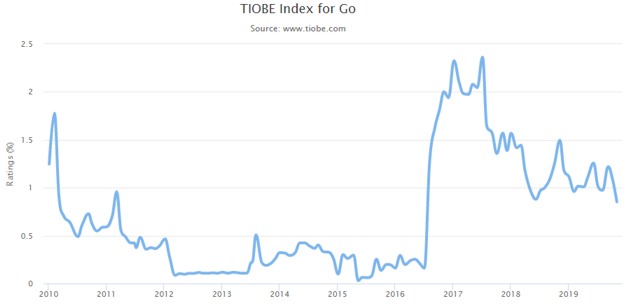| A Decade of Go - Google's Systems Language |
| Written by Sue Gee |
| Monday, 11 November 2019 |
|
Go is celebrating its 10th Birthday. This makes today a good time to look back to its roots and record its success in gaining adoption everywhere. Go, the free and open source language created at Google, first appeared on November 10, 2009. So now it has reached 10 and has established a comfortable niche for itself. Picture: Renee French Just in case you need a quick recap, Go was announced in November 2009 as as an experimental language that: combines the development speed of working in a dynamic language like Python with the performance and safety of a compiled language like C or C++. Originally an in-house project at Google initiated by Rob Pike, Robert Griesemer and Ken Thompson Go took its basic syntax from C - blocks of code are surrounded with curly braces and its flow of control structures include
As well as being an attempt to combine the ease of programming of an interpreted, dynamically typed language with the efficiency and safety of a statically typed, compiled language Go also majored on concurrency with support for networked and multicore computing. If you want a longer introduction that covers these features, here's Rob Pike's Google TechTalk, recorded a couple of week's before the launch: Go was in many respects an overnight success and was declared TIOBE Language of the Year in 2009. By the time I Programmer first reported on it in June 2010 it was at #18 in the TIOBE index. While its position on the TIOBE index has fluctuated - recording a low of #122 in May 2015 and a high of #10 in November 2018, it has always remained on the radar and was language of the year again in 2016. So what is this niche I mentioned at the beginning. As Russ Cox tells us in his post Go Turns 10, a decade after its launch Go has become the language of cloud computing: Every major cloud provider today uses core cloud infrastructure written in Go, such as Docker, Etcd, Istio, Kubernetes, Prometheus, and Terraform; the majority of the Cloud Native Computing Foundation’s projects are written in Go. Countless companies are using Go to move their own work to the cloud as well, from startups building from scratch to enterprises modernizing their software stack. Revealing that Go is used by at least a million developers worrdwide, Cox points out that Go also has uses ranging from controlling tiny embedded systems to massive big data analysis and machine learning and everything in between. Giving the final verdict to Cox on behalf of Go team; Go has succeeded beyond our wildest dreams. And Go’s success isn’t just about the language. It’s about the language, the ecosystem, and especially the community working together.
More InformationRelated ArticlesGo Turns Seven With Lots Of Attention Go Survey Shows Show Continuing Preference For Go Go 1.13 Modernizes Number Literals Go Rejects The Syntactic Sugar Of Try Go Language Of The Year With Dart Catching Up Why invent a new language? Go creator explains Go with Google - Yet Another Language! Ready to Go - Go Reaches Version 1
To be informed about new articles on I Programmer, sign up for our weekly newsletter, subscribe to the RSS feed and follow us on Twitter, Facebook or Linkedin.
Comments
or email your comment to: comments@i-programmer.info
|
| Last Updated ( Monday, 11 November 2019 ) |





